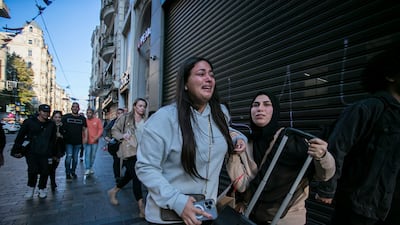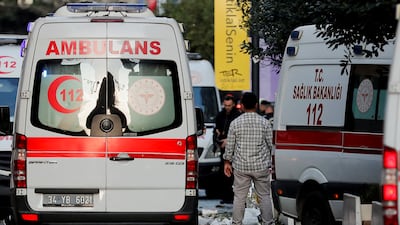Turkish police have arrested a Syrian woman suspected of planting the bomb that killed six people on a busy Istanbul shopping street on Sunday.
They said the woman was working for Kurdish militants.
She is “of Syrian nationality”, police told private NTV television. The report said the suspect admitted to receiving an order from the Kurdistan Workers' Party (PKK), which is listed as a terrorist group by Ankara and its western allies.
The PKK denied responsibility for the bombing on Monday afternoon.
“It is out of the question for us to target civilians in any way,” it said on its website.
The bombing happened on Istiklal Avenue, a popular shopping destination for locals and tourists, on Sunday afternoon, wounding dozens.
Suleyman Soylu, Turkey's Minister of Interior, said police had detained 46 people including the person suspected of planting the bomb.
He said the order for the attack on Istiklal Avenue was given in Kobani, a city in northern Syria where Turkish forces have carried out operations against the Syrian Kurdish YPG militia in recent years.
Mr Soylu said the bomber had passed through Afrin, another region in northern Syria.
Television news reports had earlier shown images of a person who appeared to be a woman leaving a package at a raised flower bed.
Fifty people were discharged from hospital after the attack, which sparked concerns that Turkey could be hit with more bombings. The country suffered a series of attacks from mid-2015 to 2017.
“The person who planted the bomb has been arrested,” Mr Soylu told the official Anadolu news agency.
“According to our findings, the PKK terrorist organisation is responsible.”
The UAE strongly condemned the attack, the Ministry of Foreign Affairs and International Co-operation said.
The ministry offered condolences to the government, the people of Turkey and the families of the victims, while wishing the injured a speedy recovery.
The PKK, or Kurdistan's Workers' Party has fought a deadly insurgency for Kurdish self-rule in south-eastern Turkey since the 1980s.
Regularly the target of Turkish military operations, the group is also at the heart of a tussle between Sweden and Turkey, which has been blocking Stockholm's entry into Nato since May, accusing it of leniency towards the PKK.
Mr Erdogan condemned the “vile attack”.
“It might be wrong if we say for sure that this is terror but according to first signs … there is a smell of terror there,” he said on Sunday.
Turkish Vice President Fuat Oktay said: “We believe that it is a terrorist act carried out by an attacker, whom we consider to be a woman, exploding the bomb”.

Justice Minister Bekir Bozdag said: “A woman had been sitting on one of the benches for more than 40 minutes and then she got up.”
“One or two minutes later, an explosion occurred,” he told A Haber television.
“There are two possibilities. There's either a mechanism placed in this bag and it explodes, or someone remotely explodes [it].
“All data on this woman are currently under scrutiny.”
Mr Soylu's announcement did not add any details about the suspect.
Turkish cities have been struck by extremists and other groups in the past.
Famous shopping street a target of attacks
Istiklal Avenue was hit during a campaign of attacks in 2015-2017 that involved Istanbul and other cities, including Ankara.
The bombings were mostly blamed on ISIS and outlawed Kurdish militants, killing nearly 500 people and wounded more than 2,000.
Sunday's explosion happened shortly after 4pm.
Helicopters flew over the city centre after the attack. Police established a large security cordon to prevent access to the area for fear of a second explosion.
Images posted on social media showed the explosion was followed by flames and panic, with people running in all directions.
Several bodies were seen lying on the ground nearby.
“I was 50 to 55 metres away, suddenly there was the noise of an explosion. I saw three or four people on the ground,” Cemal Denizci, 57, told AFP.
“People were running in panic. The noise was huge. There was black smoke.”
Istiklal Avenue, in the historic district of Beyoglu, is one of the most famous arteries of Istanbul. It is pedestrianised for 1.4 kilometres.
Criss-crossed by an old tramway and lined with shops and restaurants, it attracts large crowds at weekends.
Many stores closed early in the neighbouring district of Galata. A mass of security forces members barred all entrances and rescue workers and police could be seen.
Turkey's radio and television watchdog, RTUK, placed a ban on broadcasters showing footage of the explosion, a measure previously taken in the aftermath of extremist attacks.
Access to social media was also restricted after the attack.
A reaction came quickly from Greece, which “unequivocally” condemned the blast and expressed condolences to the government and people of Turkey.
The US also denounced it. White House press secretary Karine Jean-Pierre said: “We stand shoulder-to-shoulder with our Nato ally Turkey in countering terrorism.”
French President Emmanuel Macron said in a message to the Turks: “We share your pain. We stand with you in the fight against terrorism”.
“Shaken by news of the despicable bombing in Istanbul targeting innocent civilians,” Israeli President Isaac Herzog tweeted in Turkish and English. “The whole world must stand united and firm against terror.”
Ukrainian President Volodymyr Zelensky also tweeted in Turkish: “The pain of the friendly Turkish people is our pain.”
EU Council President Charles Michel offered condolences to Turkey, tweeting: “My thoughts are with the victims and their families.”

















